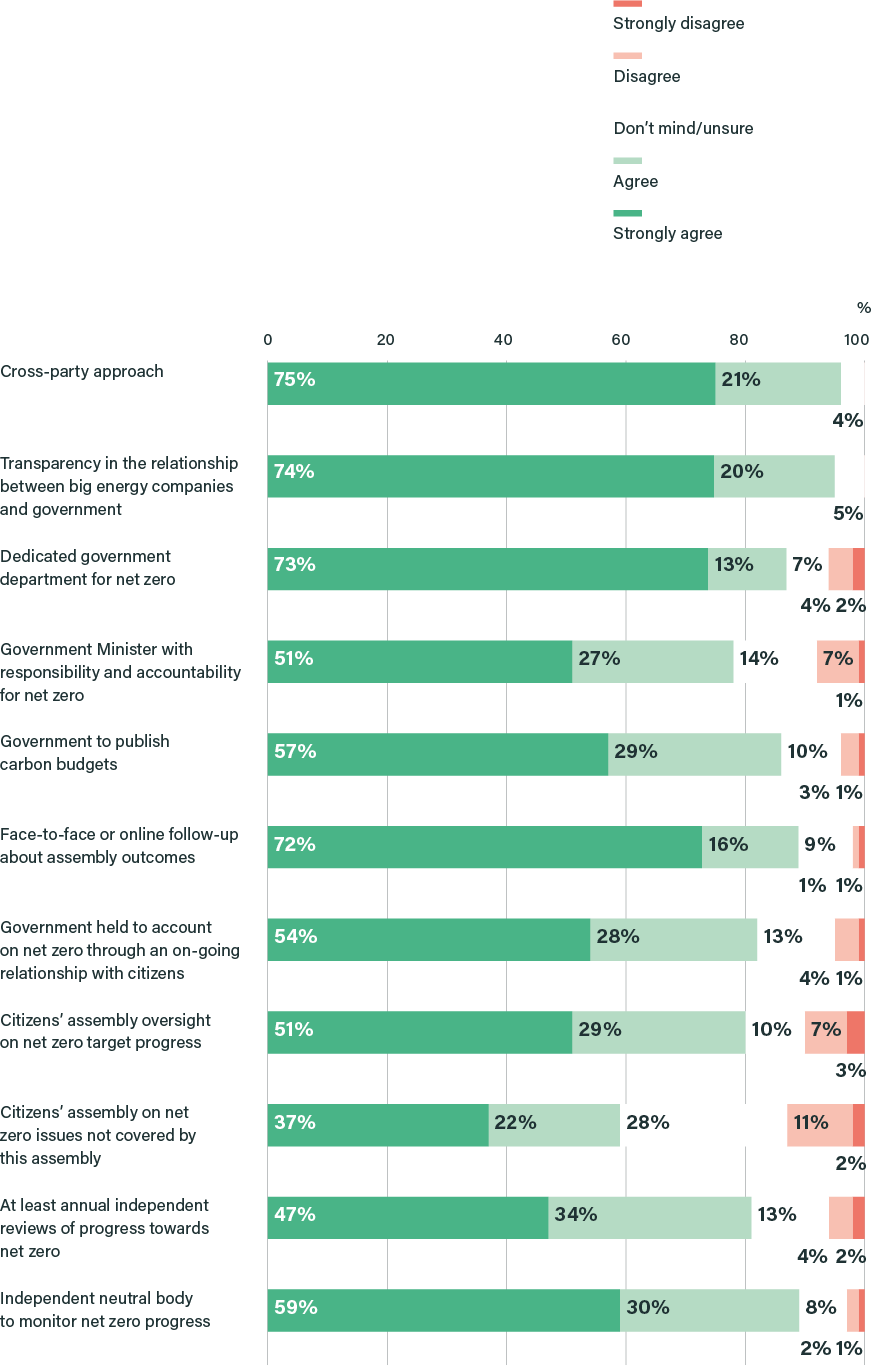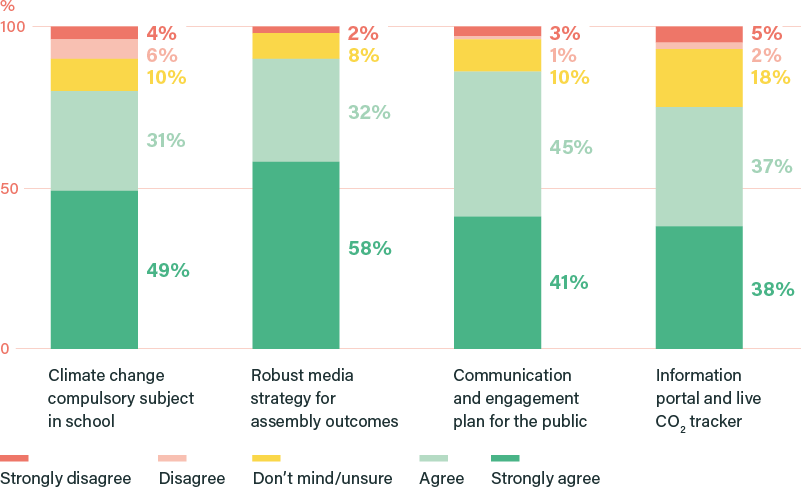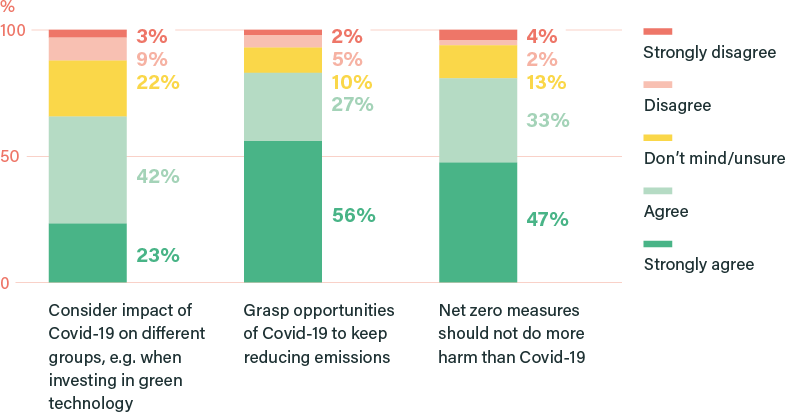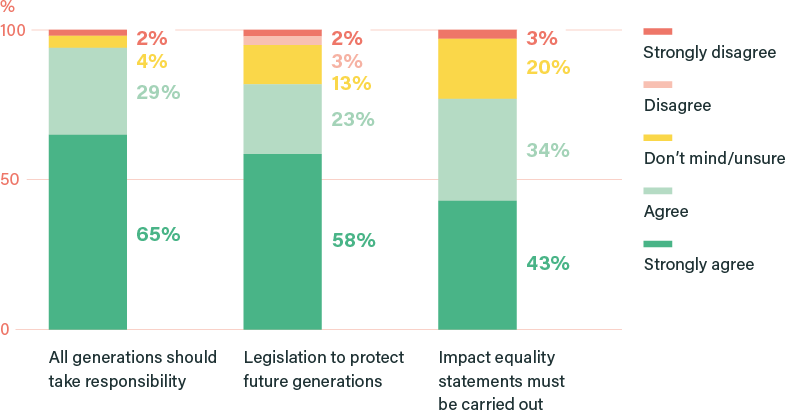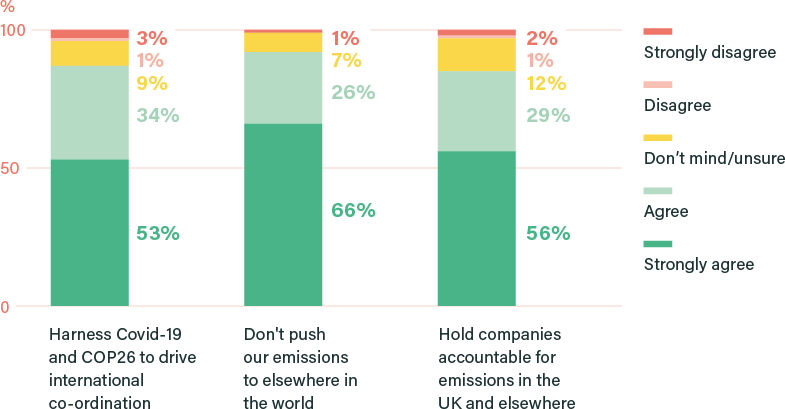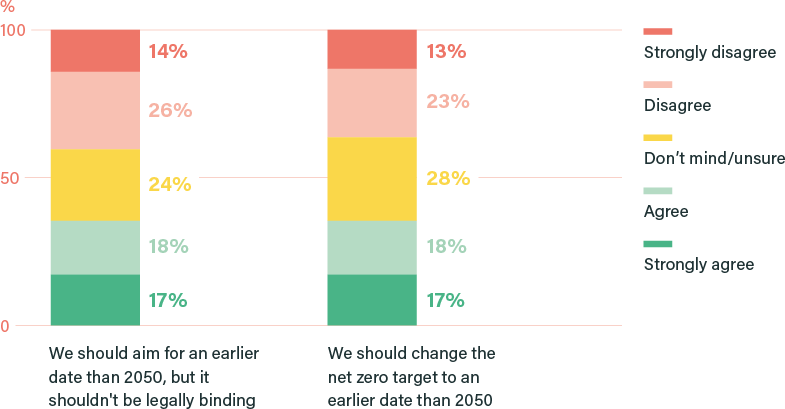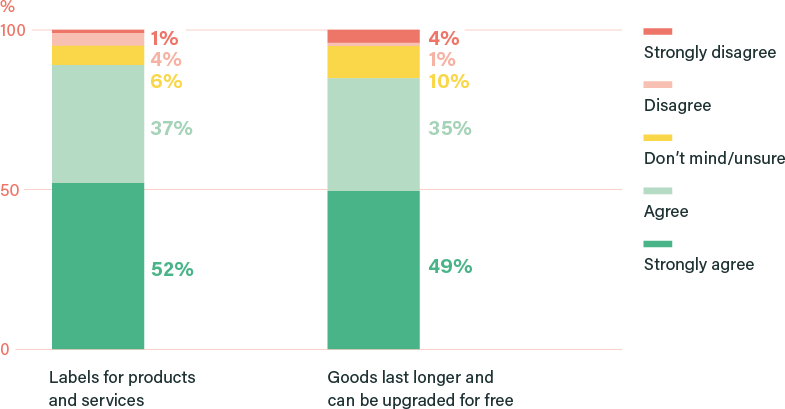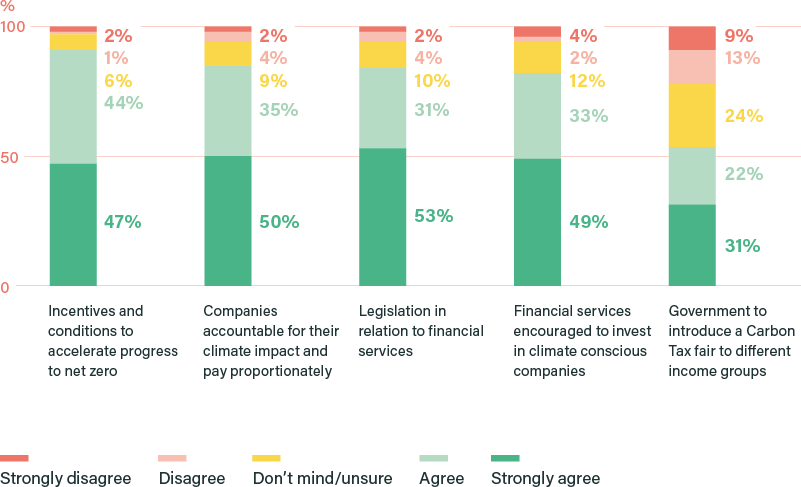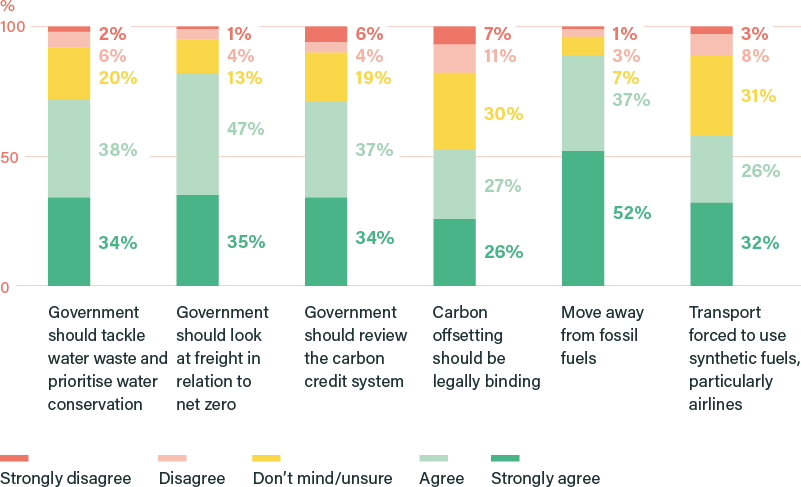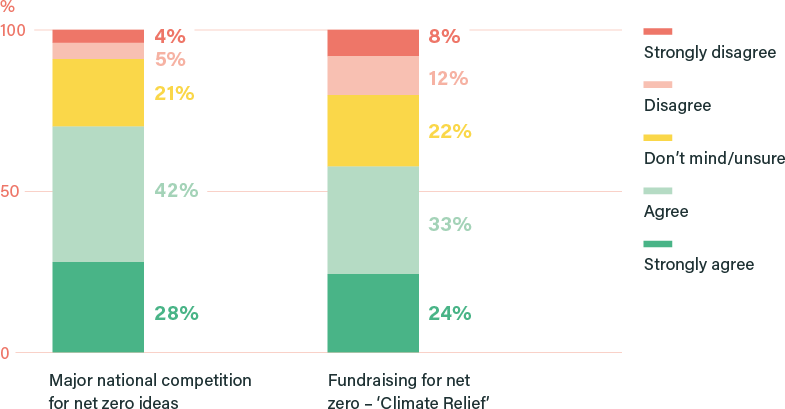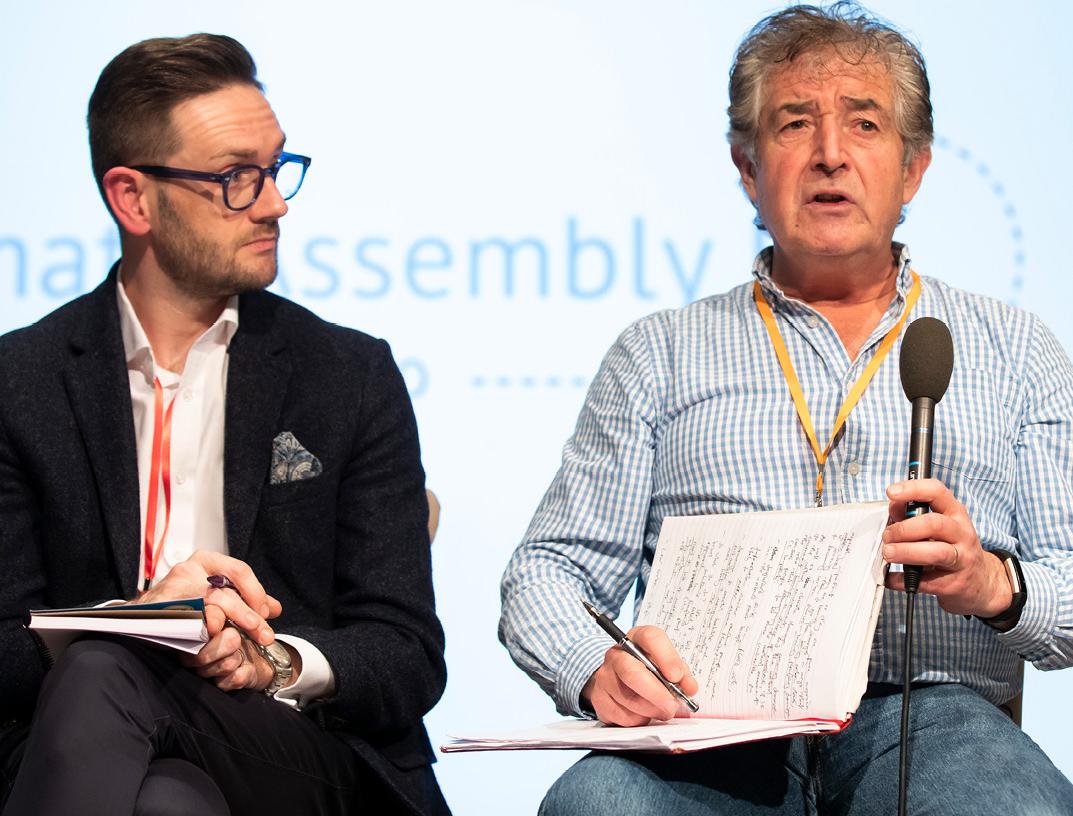Additional recommendations

Previous section: Covid-19, recovery and the path to net zero
(Contents)
- On the final assembly weekend, all assembly members discussed whether or not they wanted to add any further recommendations to this report. Assembly members worked together to draft suggested additions. The proposals were then put to a vote of the whole assembly.
- In total, assembly members voted in favour of thirty-nine additional recommendations. They did not pass two further proposals. The recommendations touch on themes including: transparency, accountability and decision-making; education, communication and engagement; international action and impacts; and incentives, payments, conditions, and taxes.
- For the full list and wording of each recommendation – some are detailed – please keep reading this chapter. The ten additional recommendations that received most support were:
- The transition to net zero should be a cross-political party issue, and not a partisan one (96% support) 1
- More transparency in the relationship between big energy companies and government (94% support)
- Get to net zero without pushing our emissions to elsewhere in the world (92% support)
- Incentives to accelerate progress to net zero and conditions attached for organisations seeking government financial support (91% support)
- A robust media strategy on the outcomes of the assembly (90% support)
- An independent neutral body that monitors and ensures progress to net zero, including citizens assemblies and independent experts (89% support)
- Move away from fossil fuels and transition to new energy sources (89% support)
- Products and services labelled to include their carbon footprint (89% support)
- A follow up on the outcomes of the assembly covering what has been taken into account, what hasn't and why (88% support)
- Harness the response to Covid-19 and COP26 to drive international co-ordinated action on climate change (87% support)
Notes ():
1: % of assembly members who 'strongly agreed' or 'agreed' with the recommendation.
The assembly did not pass two proposals. Both focussed on reaching net zero by an earlier date than 2050. Slightly more assembly members opposed such a move than supported it, with the balance held by those who were 'unsure' or 'didn't mind'.
On the final assembly weekend, all assembly members discussed whether or not they wanted to add any further recommendations to this report.
Assembly members could suggest recommendations on any aspect of the path to net zero. They started by thinking, as individuals, about the following question:2
Notes ():
2: The facilitators had encouraged assembly members to think about this question at previous assembly weekends and to note down thoughts. We kept a list of their suggestions and presented them back to the assembly at this point so that assembly members could pick the ideas up in their discussions if they wanted to.
"Is there anything else you would like to tell government and Parliament about how the UK should get to net zero?"
They then discussed emerging proposals in small groups, with each group able to put forward a maximum of three ideas. The facilitation team turned these ideas into a ballot paper, using assembly members' own wording.3 There were forty-one suggestions for additional recommendations in total. Assembly members then voted by secret ballot.
Notes ():
3: The only exception is where facilitators combined ideas that were so similar as to be almost identical. Here they retained as much of the original wording as possible, only making small changes as necessary to accommodate variations in language or nuance.
Assembly members did not hear any new evidence to inform their votes. Their decisions were based on their own experiences, values, views and knowledge, and the information they had heard throughout the assembly. We made clear to assembly members that they did not have to vote on all the proposals if they did not want to, or that they could choose 'unsure' if they did not feel they had sufficient information to express a view.
In total, a majority of assembly members backed thirty-nine additional recommendations. They rejected two.
The results for all the recommendations are included below. We have categorised them under the following headings to make them easier to navigate:
- Transparency, accountability and decision-making;
- Education, communication and engagement;
- Covid-19;
- Generations and equality;
- International action and impacts;
- The net zero target date;
- What we buy;
- Incentives, payments, conditions, and taxes;
- Other specific policy areas;
- Miscellaneous.
We used the same headings to organise the proposals on assembly members' ballot papers.
A majority of assembly members 'strongly agreed' or 'agreed' with all the suggested recommendations in this category:
- Levels of 'strong agreement' were generally high: A majority of assembly members 'strongly agreed' with nine of the eleven suggested recommendations. Over 70% 'strongly agreed' with four of them (please see below);
- Levels of 'strong disagreement' and 'disagreement' were low. No assembly members 'strongly disagreed' or 'disagreed' with two recommendations – making the transition to net zero a cross-party issue and greater transparency about the relationship between government and big energy companies;
- A proposal for citizens' assemblies on issues relating to net zero not covered by Climate Assembly UK, potentially including the net zero target date, was the least popular option in this category, with a high number of assembly members (28%) saying they 'didn't mind' or were 'unsure.'
The full wording of each recommendation was as follows. Recommendations are listed in order of popularity:4
Notes ():
4: % of assembly members who 'strongly agreed' or 'agreed' with the recommendation.
- "We want the transition to net zero to be a cross-political party issue, and not a partisan issue" (96% support)
- "We need much more transparency in the relationship between big energy companies and the government, due to concerns over lobbying and influence" (94% support)
- "There should be an independent neutral body that is not political and lasts beyond political cycles that monitors and ensures progress to net zero – including citizens' assemblies (as a neutral and fair option) and independent experts – to guarantee continued progress and policy development" (89% support)
- "A follow up on the outcomes of Climate Assembly UK is needed to ensure we know: 1- how Parliament and government have taken the assembly's recommendations on board, 2- what has been taken into account, what hasn't and why. This follow up could be done face-to-face or online, funding should be allocated for doing it, and citizens from Climate Assembly UK should be able to directly ask questions to Parliament or government" (88% support)
- "There should be a dedicated department for achieving net zero which holds regular briefings with clear milestones that hold the government to account" (86% support)
- "The government should publish the carbon budgets (i.e. the 5 yearly plans showing where the UK should be on its path to net zero) and progress towards them on a quarterly basis" (86% support)
- "Government should be better held to account for their action on net zero by an on-going relationship with citizens through mechanisms like regular citizens' assemblies" (82% support)
- "There should be regular (at least annual) independent reviews, citizens' assemblies and scrutiny by the six parliamentary committees to ensure progress is being made by government to reach net zero" (81% support)
- "The Government should commission a citizens' assembly, or an independent citizens' forum / citizens body, to provide oversight on meeting the net zero target. This could take the form of:
- On-going citizens' assemblies to ensure that all political parties and all governments are committed to implementing Climate Assembly UK's recommendations; monitor the progress of the implementation of these recommendations; ensure that future assemblies can review what the government does for achieving net zero, based on new evidence (science and technology) coming in, and/or
- Regular non-partisan committees of the public, based on the same demographic as Climate Assembly UK, to review progress to hold the government to account against a visible time-line" (80% support)
- "There should be a Minister with exclusive responsibility and accountability for ensuring net zero targets are met and government departments are co-ordinated in their efforts and achievements to meet their targets" (78% support)
- "We need another climate assembly or citizens' assemblies on issues relating to net zero that have not been discussed, to involve citizens and business. This could include looking at whether the 2050 target is too late" (59% support)
Cross-party approach
75% Strongly Agree
21% Agree
4% Don’t mind or unsure
0% Disagree
0% Strongly disagree
Transparency in the relationship between big energy companies and government
74% Strongly Agree
20% Agree
5% Don’t mind or unsure
0% Disagree
0% Strongly disagree
Dedicated government department for net zero
73% Strongly Agree
13% Agree
7% Don’t mind or unsure
4% Disagree
2% Strongly disagree
Government Minster with responsibility and accountability for net zero
51% Strongly Agree
27% Agree
14% Don’t mind or unsure
7% Disagree
1% Strongly disagree
Government to publish carbon budgets
57% Strongly Agree
29% Agree
10% Don’t mind or unsure
3% Disagree
1% Strongly disagree
Face-to-face or online follow-up about assembly outcomes
72% Strongly Agree
16% Agree
9% Don’t mind or unsure
1% Disagree
1% Strongly disagree
Government held to account on net zero through an on-going relationship with citizens
54% Strongly Agree
28% Agree
13% Don’t mind or unsure
4% Disagree
1% Strongly disagree
Citizens’ assembly oversight on net zero target progress
51% Strongly Agree
29% Agree
10% Don’t mind or unsure
7% Disagree
3% Strongly disagree
Citizens’ assembly on net zero issues not covered by this assembly
37% Strongly Agree
22% Agree
28% Don’t mind or unsure
11% Disagree
2% Strongly disagree
At least annual independent reviews of progress towards net zero
47% Strongly Agree
34% Agree
13% Don’t mind or unsure
4% Disagree
2% Strongly disagree
Independent neutral body to monitor net zero progress
59% Strongly Agree
30% Agree
8% Don’t mind or unsure
2% Disagree
1% Strongly disagree
Figure 1: Transparency, accountability and decision-making: Please tell us how much you agree or disagree with each of the following (%)
Climate change compulsory subject in school
49% Strongly Agree
31% Agree
10% Don’t mind or unsure
6% Disagree
4% Strongly disagree
Robust media strategy for assembly outcomes
58% Strongly Agree
32% Agree
8% Don’t mind or unsure
2% Disagree
0% Strongly disagree
Communication and engagement plan for the public
41% Strongly Agree
45% Agree
10% Don’t mind or unsure
1% Disagree
3% Strongly disagree
Information portal and live CO2 tracker
38% Strongly Agree
37% Agree
15% Don’t mind or unsure
2% Disagree
5% Strongly disagree
Figure 2: Education, communication and engagement: Please tell us how much you agree or disagree with each of the following (%)
At least 75% of assembly members 'strongly agreed' or 'agreed' with all the recommendations in this category. The percentage of assembly members 'disagreeing' or 'strongly disagreeing' was low throughout, never amounting to more than 10% in total.
The full wording of each recommendation was as follows. Recommendations are listed in order of popularity:
- "A robust media strategy on the outcomes of Climate Assembly UK should be put in place so that the recommendations of the assembly are widely disseminated because the nation needs to know about it and we have a duty to inform and educate everyone" (90% support)
- "There should be a communication and engagement plan to engage the public, with multiple formats, which also ensures there is local level engagement as well as feeding back to central government" (86% support)
- "Climate change should be made a compulsory subject in all schools" (80% support)
- "In order to support the public to understand climate science, progress towards net zero and relevant technology, the government and Parliament should develop and fund an information portal and live CO2 tracker" (75% support)
Consider impact of Covid-19 on different groups e.g. when investing in green technology
23% Strongly Agree
42% Agree
22% Don’t mind or unsure
9% Disagree
3% Strongly disagree
Grasp opportunities of Vodi-19 to keep reducing emissions
56% Strongly Agree
27% Agree
10% Don’t mind or unsure
5% Disagree
2% Strongly disagree
Net zero measures should not do more harm than Covid-19
47% Strongly Agree
33% Agree
13% Don’t mind or unsure
2% Disagree
4% Strongly disagree
Figure 3: Covid-19: Please tell us how much you agree or disagree with each of the following (%)
Over 60% of assembly members 'strongly agreed' or 'agreed' with all the suggested recommendations in this category:
- The two most popular were grasping the opportunities presented by Covid-19 (83%) and ensuring that net zero measures do no more harm than the current situation (80%);
- A higher number of assembly members said they were 'unsure' or 'didn't mind' about considering the impact of Covid-19 on different groups (22%, compared to 10% and 13% for the other proposals). It also received considerably less 'strong' support (23%, compared to 56% and 47%).
- The percentage of assembly members who 'strongly disagreed' or 'disagreed' with any of the recommendations was low (never more than 12% in total).
The full wording of each recommendation was as follows. Recommendations are listed in order of popularity:
- "We should grasp the opportunities that have arisen from Covid-19 to maintain the momentum in reducing emissions" (83% support)
- "Any measures taken to reach net zero should not do more harm than the current situation" (80% support)
- "We must consider the impact of Covid-19 on different regions, age groups and sectors when investing in green technology and job creation" (65% support)
All generations should take responsibility
65% Strongly Agree
29% Agree
4% Don’t mind or unsure
2% Disagree
0% Strongly disagree
Legislation to protect future generations
58% Strongly Agree
23% Agree
13% Don’t mind or unsure
3% Disagree
2% Strongly disagree
Impact equality statements must be carried out
43% Strongly Agree
34% Agree
20% Don’t mind or unsure
3% Disagree
0% Strongly disagree
Figure 4: Generations and equality: Please tell us how much you agree or disagree with each of the following (%)
Over 70% of assembly members 'strongly agreed' or 'agreed' with all the recommendations in this category:
- Levels of 'strong disagreement' or 'disagreement' were very low, never reaching more than 5%;
- A relatively high number of assembly members (20%) said they 'didn't mind' or were 'unsure' about impact equality statements.
The full wording of each recommendation was as follows. Recommendations are listed in order of popularity:
- "All generations should take responsibility, not just young people" (94% support)
- "There should be legislation to protect future generations" (81% support)
- "Impact equality statements must be carried out so that we carry the rest of society with us, especially the most vulnerable" (77% support)
Harness Covid-19 and Cop26 to drive international co-ordination
53% Strongly Agree
34% Agree
9% Don’t mind or unsure
1% Disagree
3% Strongly disagree
Don’t push our emission to elsewhere in the world
66% Strongly Agree
26% Agree
7% Don’t mind or unsure
0% Disagree
1% Strongly disagree
Hold companies accountable for emissions in the UK and elsewhere
56% Strongly Agree
29% Agree
12% Don’t mind or unsure
1% Disagree
2% Strongly disagree
Figure 5: International action and impacts: Please tell us how much you agree or disagree with each of the following (%)
Over 80% of assembly members 'strongly agreed' or 'agreed' with all the recommendations in this category, with a majority 'strongly agreeing' in all cases. Levels of 'strong disagreement' or 'disagreement' were very low, never rising to more than 4% in total.
The full wording of each recommendation was as follows. Recommendations are listed in order of popularity:
- "We should get to net zero without pushing our emissions to elsewhere in the world" (92% support)
- "We should harness the opportunities afforded by the response to Covid-19 and the upcoming COP26 event to drive a conversation about more international co-ordinated action on climate change" (87% support)
- "We should hold companies accountable, including through the UK financial markets, for their emissions in the UK and around the world and stop the shifting of CO2 elsewhere" (85% support)
We should aim for an earlier date than 2050, but it shouldn’t be legally binding
17 % Strongly Agree
18% Agree
24% Don’t mind or unsure
26% Disagree
14% Strongly disagree
We should change the net zero target to an earlier date than 2050
17% Strongly Agree
18% Agree
28% Don’t mind or unsure
23% Disagree
13% Strongly disagree
Figure 6: The net zero target date: Please tell us how much you agree or disagree with each of the following (%)
The two proposals in this category were the only suggestions for additional recommendations not passed by assembly members.
The full wording of each suggested recommendation was as follows.
- "We should change the date for achieving net zero to an earlier date in line with other countries like Finland and Iceland" (35% support, 28% don't mind/unsure, 36% oppose)
- "We should be aiming for an earlier target than 2050; it shouldn't be legally binding, but the Government should face consequences if they do not meet this earlier target; for example, there should be a vote of no confidence in the Government" (35% support, 24% don't mind/unsure, 40% oppose)
Labels for products and services
52% Strongly Agree
37% Agree
6% Don’t mind or unsure
4% Disagree
1% Strongly disagree
Goods last longer and can be upgraded for free
49% Strongly Agree
35% Agree
10% Don’t mind or unsure
1% Disagree
4% Strongly disagree
Figure 7: What we buy: Please tell us how much you agree or disagree with each of the following (%)
Over 80% of assembly members 'strongly agreed' or 'agreed' with all the suggested recommendations in this category. Levels of 'strong disagreement' or 'disagreement' were very low, never rising above 5% in total.
The full wording of each recommendation was as follows. Recommendations are listed in order of popularity:
- "Products and services should be labelled to include their carbon footprint" (89% support)
- "We need a complete overhaul of our 'disposable' consumer culture, so that the goods we buy last much longer and can be upgraded for free" (84% support)
Over 80% of assembly members 'strongly agreed' or 'agreed' with four of the suggested recommendations in this category (please see below). Levels of 'strong disagreement' or 'disagreement' with these proposals were very low, never reaching more than 6% in total.
The final suggested recommendation around introducing a carbon tax was more controversial: a slim majority of assembly members (53%) supported it; 24% were 'unsure' or 'didn't mind'; 22% opposed it.
Incentives and conditions to accelerate progress to net zero
47% Strongly Agree
44% Agree
6% Don’t mind or unsure
1% Disagree
2% Strongly disagree
Companies accountable for their climate impact and pay proportionality
50% Strongly Agree
35% Agree
9% Don’t mind or unsure
4% Disagree
2% Strongly disagree
Legislation in relation to financial services
53% Strongly Agree
31% Agree
10% Don’t mind or unsure
4% Disagree
2% Strongly disagree
Financial services encouraged to invest in climate conscious companies
49% Strongly Agree
33% Agree
12% Don’t mind or unsure
2% Disagree
4% Strongly disagree
Government to introduce a Carbon Tax fair to different income groups
31% Strongly Agree
22% Agree
24% Don’t mind or unsure
13% Disagree
9% Strongly disagree
Figure 8: Incentives, payments, conditions and taxes: Please tell us how much you agree or disagree with each of the following (%)
The full wording of each recommendation was as follows. They are listed in order of popularity:
- "There should be incentives for groups, organisations and businesses that accelerate progress to net zero, along with conditions attached to groups, organisations and businesses that are seeking government aid" (91% support)
- "All companies should be accountable for their impact on climate change and pay proportionately for their impact through greater regulation and more stringent rules on tax collection" (85% support)
- "Legislation [laws] should be used in relation to financial services to ensure investment in renewable energy and to make oil companies pay for the true costs of their activities" (84% support)
- "Financial services should be encouraged to invest in climate conscious companies" (82% support)
- "The Government should introduce a carbon tax, which is fair for people of different incomes" (53% support)
Government should tackle waste water and prioritise water conservation
34% Strongly Agree
38% Agree
20% Don’t mind or unsure
6% Disagree
2% Strongly disagree
Government should look at freight in relation to net zero
35% Strongly Agree
47% Agree
13% Don’t mind or unsure
4% Disagree
1% Strongly disagree
Government should review the carbon credit system
34% Strongly Agree
37% Agree
19% Don’t mind or unsure
4% Disagree
6% Strongly disagree
Carbon offsetting should be legally binding
26% Strongly Agree
27% Agree
30% Don’t mind or unsure
11% Disagree
7% Strongly disagree
Move away from fossil fuels
52% Strongly Agree
37% Agree
7% Don’t mind or unsure
3% Disagree
1% Strongly disagree
Transport forced to use synthetic fuels, partially airlines
32% Strongly Agree
26% Agree
31% Don’t mind or unsure
6% Disagree
3% Strongly disagree
Figure 9: Other specific policy areas: Please tell us how much you agree or disagree with each of the following (%)
Over 70% of assembly members 'strongly agreed' or 'agreed' with five of the suggested recommendations in this category (please see below). Levels of 'strong disagreement' or 'disagreement' with these proposals were low, never rising above 10% in total.
Fewer assembly members (58% and 53%, respectively) supported the other two suggested recommendations, around synthetic fuels and carbon offsetting. Levels of opposition were however low (11% for synthetic fuels) or moderate (18% for carbon offsetting). High numbers of assembly members said they were 'unsure' or 'didn't mind' (31% and 30%, respectively) about these proposals.
The full wording of each recommendation was as follows. They are listed in order of popularity:
- "To meet our green energy models of production we will need to transition through the various energy technologies available, moving away from fossil fuels" (89% support)
- "The Government should look into freight when planning / acting on meeting the net zero target" (82% support)
- "The Government should tackle water waste in its efforts to meet the net zero target. Water conservation should be a priority moving forward" (72% support)
- "Government and parliament should look at carbon credits and fix / scrap the system if it's not working" (71% support)
- "The airline industry in particular, but other transport of all types, must be forced to use synthetic fuels (hydrogen / carbon) to be carbon neutral unless a better technology is developed" (58% support)
- "Carbon offsetting should be legally binding and everyone must offset their emissions" (53% support)
Major national competition for net zero ideas
28% Strongly Agree
42% Agree
21% Don’t mind or unsure
5% Disagree
4% Strongly disagree
Fundraising for net zero – ‘Climate relief’
24% Strongly Agree
33% Agree
22% Don’t mind or unsure
12% Disagree
8% Strongly disagree
Figure 10: Miscellaneous: Please tell us how much you agree or disagree with each of the following (%)
A majority of assembly members 'strongly agreed' or 'agreed' with both the suggested recommendations in this category – in one case by a relatively large margin (70%) and in one case by a slim one (57%). Relatively high numbers of assembly members (21% and 22%) said they 'didn't mind' or were 'unsure' about both proposals.
The full wording of each recommendation was as follows. They are listed in order of popularity:
- "There should be a major national competition/challenge/prize for the best invention or initiative to address net zero and that the winners are implemented" (70% support)
- "We should enable individuals, influencers and charities to contribute to getting to net zero by raising funds through an event – 'climate relief', similar to comic relief but with a climate change focus" (57% support)
Assembly members made thirty-nine additional recommendations in total. Many received high levels of backing: at least 80% of assembly members supported twenty-five of the recommendations; at least two-thirds supported thirty-four of them.
The recommendations covered a broad range of areas, and included statements at the level of aims as well as more specific policy proposals:
- Some recommendations picked up or fleshed out themes present since the assembly's very first decision on underpinning principles for the path to net zero – for example, the recommendations around information and education, government leadership and the need for a cross-party approach;
- Some recommendations re-emphasised decisions that had already been made – for example, on labelling for products and services;
- Others raised new points – for example, around water use, and financial services – or allowed assembly members to vote formally on issues that had come up in discussion at earlier weekends.
The assembly did not support two proposals, both around reaching net zero earlier than 2050. Slightly more assembly members opposed such a move than supported it, with the balance held by those who were 'unsure' or 'didn't mind.'
The assembly members' agreement of their additional recommendations brought the assembly process to its close. It marked the completion of Climate Assembly UK's recommended path to net zero.
Above : Chris Stark (Committee on Climate Change) and Tony Juniper (Natural England) take questions from assembly members.
The six commissioning select committees would like to thank:
- The delivery team of Involve, Sortition Foundation, mySociety and officials in the House of Commons' Committee Office and Parliamentary Office of Science and Technology, including the facilitation and support teams for the assembly weekends;
- The Expert Leads (Chris Stark, Jim Watson, Lorraine Whitmarsh and Rebecca Willis), as well as Jenny Hill and Jillian Anable for the support provided to them;
- Members of Climate Assembly UK's Advisory Panel and Academic Panel, and the figures from wider society who engaged and inputted to the assembly's work;
- The Energy and Climate Intelligence Unit, Kitsch.inc, Switch New Media and Richard Jolly.TV, and Effusion for their support with communications outreach, social media, pre-recording and live-streaming speakers' presentations, and the design of this report, respectively;
- The forty-three speakers who, alongside the Expert Leads, presented to the assembly, and JUST:Access for transcribing their talks and plenary Q&As for the assembly's website;
- Picture Zero Productions and Curious Films for their interest in the assembly and providing footage for use around the launch of this report, and Lucy Stone for introducing them and others to the assembly's delivery team;
- The independent evaluation team working to evaluate the assembly (Jayne Carrick, Professor Stephen Elstub, Professor David Farrell);
- Sir David Attenborough for his support and for giving up his time to come to Climate Assembly UK to meet its members;
- The Esmée Fairbairn Foundation and European Climate Foundation for their financial support and willingness to provide it without any say over the assembly's design and content.
Most of all we would like to thank the assembly members for their dedication, hard work, and the thoughtful and considered nature of their recommendations.
Photos of Assembly by Fabio de Paola / PA Wire
Design by Effusion
Footnotes
1 % of assembly members who 'strongly agreed' or 'agreed' with the recommendation.
2 The facilitators had encouraged assembly members to think about this question at previous assembly weekends and to note down thoughts. We kept a list of their suggestions and presented them back to the assembly at this point so that assembly members could pick the ideas up in their discussions if they wanted to.
3 The only exception is where facilitators combined ideas that were so similar as to be almost identical. Here they retained as much of the original wording as possible, only making small changes as necessary to accommodate variations in language or nuance.
4 % of assembly members who 'strongly agreed' or 'agreed' with the recommendation.
